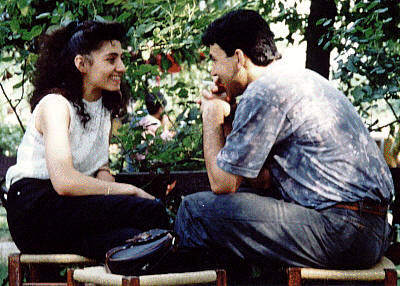The Registers of Speaking
There are five basic types of occasions in which people communicate with one another. There are many subtleties within each category. In teaching social skills the identification of these basic types of occasions is a good starting point.
Rituals: In these occasions what is said never changes. The words and intonations are always the same.
 |
Rituals are found in all types of religious services all over the world. Many prayers are always said exactly the same way each time. In school our Plead ge of Allegiance is a form of ritualized language. Civil ceremonies, such as marriages and the reading of the Miranda Rights, always contain the same words.
Seen to the left, a Hindu worshiper recites a traditional prayer. |
| Seen to the right, a man recites an ancient prayer in his neighborhood mosque. |  |
| Formal: This type of occasion is what we call "one-way" communication. The speaker provides information without a response from the listener. Situations that are formal include making a report or speech in school. Some teachers present to classes by lecturing, a form of formal language. |
| School: At school there is two way communication between the teachers and the students, as well as between students and students. The language is elevated, however, following strict guidelines of courtesy, consideration and political correctness. |
| Friends: Friends speak in an easy going style. Slang, many idioms, incomplete sentences and code words are typical. Swearing is acceptable and points of view are commonly accepted. Nicknames are common. |
 |
Entre Nous: This is the intimate language between lovers and longtime friends. There are many codes and words that have special meanings only the partners would understand. |